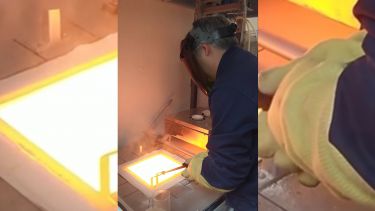The material which I learned, the skills obtained and the people that I met have all been and continue to be instrumental, in my ongoing career.

What are your main responsibilities?
Leading R&D activity in the area of photonic materials. Working with academic groups and industrial partners to develop new photonic glass materials for use in state-of-the-art technology. This involves both identifying suitable opportunities, identifying and obtaining funding, working to develop new materials and production processes and commercialising the research outcomes. Working to support wider consultancy and test work undertaken by GTS.
Can you describe a typical day?
A typical day will involve a mixture of corresponding with project partners about current and future projects, meeting new contacts both in person and remotely (video calls), undertaking laboratory work such as melting new glass compositions or characterising previously produced test materials and writing up reports and proposals.
What is the most rewarding aspect of your current role or your greatest career achievement so far?
The most rewarding part is to be undertaking research which has an impact upon a wide range of significant technologies. Materials that I am developing have applications in communications, sensing technologies and medical technologies and may also be used in big science projects relating to high energy lasers, nuclear fusion and particle physics. Knowing that the research we undertake in a small laboratory in 91Ö±˛Ą is potentially world changing is very exciting.
Are there any challenging aspects? If so, what are they?
The most challenging aspect, for me, is finding and engaging with potential partners. I am a scientist not a salesperson and so that part of the role is difficult. However, it is also very rewarding, since it is through those interactions that innovative ideas are born, and I usually come away having learned something new.
Thinking back to your degree, how do you think it prepared you for your current role?
The material which I covered through my degrees at 91Ö±˛Ą was key to my current role. I could not undertake R&D activity in glass materials without the solid foundation of knowledge and the experimental and personal skills that were developed at 91Ö±˛Ą University. The projects undertaken in my BSc and MSc alongside my PhD studies have probably had the most impact since, aside from the practical skills, this taught me how to manage and undertake research work independently and gave me opportunities to practise the communication skills that are key to disseminating research findings.
How have these skills or your course made a difference in your career?
These skills have made a massive difference. Without my studies at 91Ö±˛Ą University I would not be in my present career. The material which I learned, the skill obtained and the people that I met have all been instrumental, and continue to be instrumental, in my ongoing career.
Why did you choose to study at 91Ö±˛Ą?
I chose 91Ö±˛Ą university because it was one of the few universities which offered the course I wanted to undertake (Chemical Physics) and because of those few universities it seemed to be the best. I remained at 91Ö±˛Ą University because, when going into Materials Science, it remained one of the best universities to study at in the field and one of the only universities with a focus on nuclear materials, which was an interest for me at the time.
What were the best things about studying in your department?
Being surrounded by academics who were among the best in their field and who were undertaking research of actual industrial significance. Also, in the materials department, being able to study in a department which had a long-established history of work in materials science and glass material in particular. 91Ö±˛Ą University has a strong reputation in the area of glass materials, and I am proud to have been a student of the university.
What did you like most about the City of 91Ö±˛Ą?
It is a friendly city, a welcoming city, a green city and you can always see the hills. It is not a surprise that so many students stay here. I have now lived in 91Ö±˛Ą for 18 years, so suffice to say that I still like the place. I had hoped to feel welcome here - and I did and still do.
Did you use any of the careers support services run by the university? If you did how did they help?
No. Although informal introductions made by my PhD supervisors have been instrumental in my current career.
Were you in any student societies?
No. Which I now regret!
Where do you see yourself in the future?
My ambition is to make GTS a leader in photonic glass materials and to establish myself as a recognised expert in the field, having made significant real word impacts. I am optimistic that I might be able to achieve this. Beyond this I can see the appeal of teaching, perhaps returning to the university in some capacity. Regardless I expect I will not be leaving 91Ö±˛Ą anytime soon.
If you could give advice to current students who are starting to think about their future career what would you tell them?
Do not underestimate how important it is to meet people. An industrial placement or chance conversation at an event, society meeting or conference could make a massive difference to your future career.

